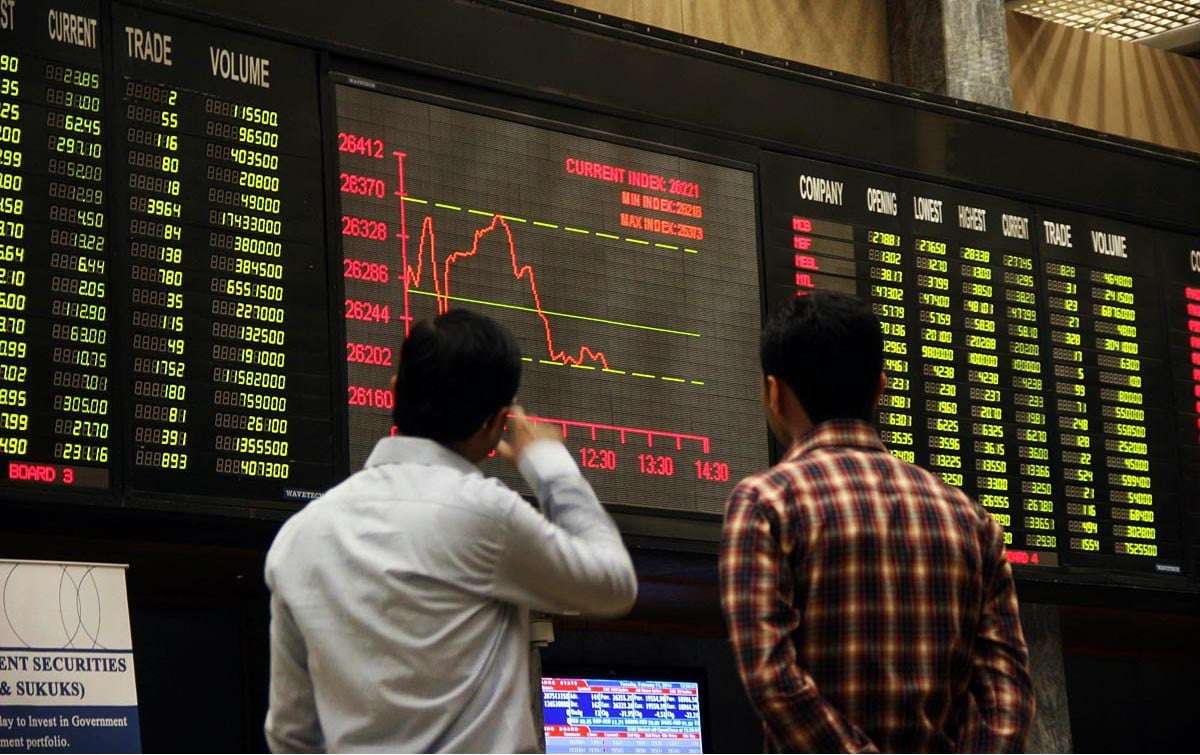
|
Getting your Trinity Audio player ready...
|
The Pakistan Stock Exchange (PSX) witnessed a tumultuous trading day on Tuesday, marked by dramatic fluctuations. The benchmark KSE-100 index, which tracks the performance of the largest companies listed on the exchange, saw its most significant single-day drop in recent history. The index tumbled by over 3,500 points, reflecting the heightened political uncertainty in the country. This article explores the factors driving the PSX’s volatility, the performance of key sectors, and the outlook for the market in light of ongoing political turmoil.
H2: Political Unrest Drives PSX Down
On Tuesday, the KSE-100 Index faced significant pressure due to the political crisis in Islamabad. As protests and unrest escalated in the capital, investor sentiment soured, leading to massive sell-offs in the stock market. The Pakistan Army was deployed to prevent the protests from spiraling further out of control, adding to investor concerns.
H3: Intra-day Movement
The market opened lower, and by mid-morning, the KSE-100 Index hit an intra-day low of 97,361 points, down sharply from the previous day’s close. This was a reflection of the uncertainty that political instability in the country had instilled in the investment community. However, a brief period of optimism followed, as buying activity in the banking sector pushed the index higher to 99,819.59 points by 11:08 AM.
Despite this brief recovery, the KSE-100 index struggled to sustain momentum. By 12:35 PM, the index had fallen by 2,281.88 points, or 2.33%, to 95,797.90 points. In the afternoon session, the downward pressure continued, and the index reached as low as 94,200 points. The day ended with the KSE-100 Index closing at 94,574, marking a loss of 3,506 points, or 3.57%.
H3: Key Drivers of the Drop
Topline Securities attributed the sharp decline to the growing political unrest, with protests and marches towards the capital causing investor panic. The uncertainty surrounding the outcome of these events significantly dampened market confidence.
H2: Previous Day’s Optimism
Interestingly, the PSX had shown a more positive trend on Monday, just a day before the sharp drop. On Monday, the KSE-100 index enjoyed a dynamic session, recovering from early losses and closing at a historic high above 98,000 points. This was largely driven by a surge in investor interest in the banking sector, which had seen an uptick in share prices due to strong earnings forecasts.
Despite the market dipping to an intra-day low of 97,137.63 points, it rebounded and soared above 99,300 points before midday. However, investors began booking profits, resulting in some of the gains being wiped out. The index eventually settled at 98,080, up by 282 points.
H2: The Role of the Banking Sector
The banking sector has been a pivotal player in both the recent bullish and bearish movements of the PSX. On Monday, the sector contributed significantly to the market’s rebound. Among the top-performing banks were Bank AL Habib, United Bank Limited, Meezan Bank, Systems Limited, and MCB Bank. These banks collectively added 555 points to the index, signaling strong investor confidence in the sector.
Ahsan Mehanti of Arif Habib Corp observed that the banking sector’s strong earnings outlook was crucial in driving up stock prices. Additionally, the Islamabad High Court’s ban on protests in the capital helped to reduce some political noise, offering a temporary respite to investors.
H2: Volatile Trading and Investor Behavior
Despite the volatility, trading activity remained healthy, with over 640 million shares changing hands during the day. Notably, Hascol Petroleum, Cnergyico PK, and Fauji Foods were the top performers in terms of volume. Hascol Petroleum, in particular, saw a surge in its trading volume, with 65 million shares traded.
The market also witnessed a mix of bullish and bearish sentiment, with 220 stocks closing higher and 185 declining. Notable gainers included Bank AL Habib (+6.75%), Sui Southern Gas Company (+10%), Waves Home Appliances (+10.05%), and Hascol Petroleum (+9.97%).
H3: Foreign Investor Activity
Foreign investors were net sellers on the day, offloading shares worth Rs1.45 billion, according to the National Clearing Company of Pakistan Limited (NCCPL). This suggests that international investors were cautious amid the political instability, adding to the downward pressure on the market.
H2: Expert Analysis and Market Outlook
Ahsan Mehanti highlighted that despite mid-session pressure due to the political uncertainty, the market closed higher, driven by strong economic indicators, rupee stability, and an increase in foreign currency reserves. The uncertainty surrounding future contracts’ rollovers and the outcome of Pakistan Tehreek-e-Insaf (PTI) protests added to the market’s volatility, but the PSX ultimately closed on a bullish note.
H3: Future Market Direction
Looking ahead, experts anticipate that the PSX may continue to experience significant volatility. The market is expected to benefit from positive macroeconomic indicators, but political uncertainty remains a key risk factor. With the upcoming political events and their potential impact on investor sentiment, the market may face further fluctuations in the short term.
Ahsan Mehanti noted that mid-session pressure due to contract rollovers and concerns over PTI protests could keep the market on edge. However, with favorable economic data, the market could also see positive momentum once the political situation stabilizes.
H2: The Role of the State Bank of Pakistan
The State Bank of Pakistan (SBP) has been actively involved in managing the country’s economic and financial stability. Investors are also speculating that the SBP might relax a condition related to the minimum deposit rate for savers, which could further boost the banking sector.
H2: Conclusion
The Pakistan Stock Exchange (PSX) has experienced considerable volatility recently, driven largely by the political instability in the country. While the market enjoyed a brief period of optimism on Monday, it saw a significant decline on Tuesday as political tensions escalated.
Investors continue to be cautious, and the political situation will likely remain a key factor influencing market movements. Despite these challenges, there are also encouraging signs of economic stability, particularly within the banking sector, which could provide some support for the market in the long run.
H2: Frequently Asked Questions (FAQs)
H3: 1. What caused the sharp drop in the PSX on Tuesday?
The sharp drop in the PSX was primarily caused by political unrest in Islamabad, where protests and marches toward the capital created uncertainty among investors.
H3: 2. Which sector performed well on Monday?
The banking sector performed well on Monday, contributing significantly to the market’s rebound. Banks such as Bank AL Habib and Meezan Bank were top performers.
H3: 3. How did foreign investors react to the political situation?
Foreign investors were cautious amid the political instability, with net selling of shares worth Rs1.45 billion during the trading session.
H3: 4. What impact did the Islamabad High Court’s decision have on the market?
The Islamabad High Court’s ban on protests in the capital helped reduce political noise, leading to a brief period of optimism and a rebound in the stock market.
H3: 5. What is the outlook for the PSX in the coming weeks?
The outlook for the PSX remains uncertain, with political instability continuing to affect investor sentiment. However, positive macroeconomic indicators may provide some support for the market.






